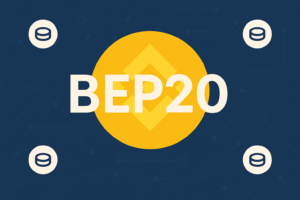
BEP20 is a standard for generating and handling fungible tokens on the BNB Smart Chain (BSC). Intended to have a uniform structure, BEP20 dictates the base rules that developers employ for minting tokens on BSC. Inspired as it may be by Ethereum’s ERC-20 standard, BEP20 has been shaped for the performance requirements of the BSC environment. It dictates the fundamental functions of token transfer, balance checks, as well as stock management. With its affordable transaction costs and fast confirmations, BEP20 is extensively utilized in decentralized finance (DeFi), NFT marketplaces, as well as blockchain gaming.
BEP20 played an important role in the accelerated growth of the BNB Smart Chain. It provided developers with a trustworthy means of minting tokens that are compatible with wallets, decentralized applications (dApps), and exchange sites. As smart contracts increasingly form the center of blockchain activity, BEP20 tokens have become popular among developers and users alike who want compatibility and efficiency.
What is BEP20?
BEP20 refers to Binance Smart Chain Evolution Proposal no. 20. It establishes the standard for how tokens are expected to act in the BSC network. Just as Ethereum uses ERC-20 in order for tokens to be consistent, BEP20 provides a clear format for generating and handling tokens on the BSC.
Tokens based on the BEP20 standard usually have features such as:
- Accessing token information such as name, symbol, and decimals
- Transfering tokens between addresses
- Granting permission for third parties to spend tokens
- Viewing Balances vs Authorized Amounts
These central features ensure that tokens are able to interact predictably within the BSC platform, allowing seamless integration with multiple platforms as well as applications.
How BEP20 is different from ERC-20
While BEP20 is founded on ERC-20 standards, there are numerous important distinctions due to the distinct structure of the BNB Smart Chain.
A key difference is that BSC runs on a Proof of Staked Authority (PoSA) consensus algorithm, which combines validator selection with delegated staking. This allows for faster block confirmations at lower costs than Ethereum’s old infrastructure, making BEP20 tokens superior for high volume, low cost use cases.
A second distinction is that BEP20 tokens are bridgeable with BEP2 tokens, the native tokens of Binance Chain. Official bridges enable people to transfer assets between the two chains. It allows for greater utility and flexibility for users of tokens in the entire Binance network.
Scalability is another defining feature of BSC. The network processes high volumes of transactions quickly, thereby making BEP20 tokens suitable for real-time uses as well as mass adoption scenarios.
Principal Uses of BEP20 Tokens
BEP20 tokens are useful for an array of different applications across blockchains. These include financial tools, governance systems, in-game economics, as well as wrapped representations of assets.
Examples include
- Stablecoins like BUSD, tied to fiat currencies for payment as well as for trading
- Governance tokens: Utilized in voting systems in decentralized companies
- Staking and farming tokens: Incentives in DeFi platforms for liquidity provision
- Game tokens: Virtual currencies applied in blockchain games
- Wrapped assets: Such as BTCB (Bitcoin) or ETH, which provide cross-chain access on BSC
Due to their versatility, BEP20 tokens are embraced extensively by projects going on the BSC platform that need predictable performance and compatibility in their network.
Developing a BEP20 Token
Experienced Ethereum developers can easily create BEP20 tokens as they can code the contract in Solidity, deploy it on the BSC, and utilize blockchain development frameworks like Remix, Hardhat, or Truffle for testing as well as interaction.
Key elements of a BEP20 token contract are:
- Token name and symbol
- Number of decimal units (usually specified as 18)
- Total supply of tokens
- Administrative or ownership address
- Optional features such as minting, burning, or freezing
The token contract must support standard functions like transfer, approve, transferFrom, balanceOf, as well as allowance. For varied use cases, features such as transaction costs, blacklists, or time-locks can be included as well.
Once deployed, the tokens can be verified on BscScan, made exchangeable on decentralized sites like PancakeSwap, and included in supported wallets.
Wallets that support BEP20
A broad range of crypto wallets are compatible with BEP20 tokens. Such wallets are able to interface with the BSC network and allow users to send, receive, and store their assets.
Popular BEP20-friendly wallets include
- MetaMask – Browser wallet that can be manually configured for BSC
- Trust Wallet is a mobile wallet with inbuilt BEP20 token support
- SafePal – Offline hardware wallet for secure storage of BSC tokens
- Binance Wallet – An Official Browser Extension for Managing BEP2 and BEP20 Assets
- Users must at all times ensure their wallet is on the proper network. Sending BEP20 tokens via an Ethereum address without the use of a bridge can lead to the loss of assets in an irreversible manner.
Security Risks and Recommendations
Though useful, BEP20 is fraught with some security threats, owing in major part to the relative ease of token creation on the BSC.
Common risks are:
- Fake tokens: Proportional in appearance to authentic movies but masquerading as such
- Insecure smart contracts: Bugs or bad design may create vulnerabilities
- Excessive developer control: certain token contracts provide developers unlimited power over minting or balance changes
In order to protect themselves, users can check token contracts on reputable sites such as BscScan, cross-validate project data from official sites, and refrain from conducting activities with unknown or questionable dApps
Popular Examples of BEP20 Tokens
Several top digital assets have BEP20 implementations for use on BSC. These tokens provide an affordable way for trading as well as participating in DeFi activities.
Popular examples are:
- BUSD is a widely used U.S. dollar-pegged stablecoin on the BSC platform
- CAKE is PancakeSwap’s native token for utility, for voting, as well as for staking rewards
- BTCB – Tokenized Bitcoin for use in DeFi on the BSC
- ETH – a wrapped Ethereum token for compatibility in the BSC environment
- WBNB – Wrapped form of the popular cryptocurrency, utilized in smart contract operations
These assets provide users with access to known cryptocurrencies while leveraging the efficiency of the BSC network.
Use in Decentralized Applications
Most decentralized applications on the BSC are built upon BEP20 tokens as the backbone. For payments, governance, or liquidity, they are the central unit of interaction in dApps.
Examples of this are
- PancakeSwap: Giant decentralized exchange utilizing BEP20 tokens in liquidity pools as well as in trading pairs
- Venus Protocol: An asset lending and borrowing platform for BEP20 assets
- Autofarm: An aggregator for DeFi that provides automated yield farming using BEP20 tokens
These illustrate how BEP20 tokens act as critical infrastructure within the expanding decentralized economy of the BSC.
What is in store for BEP20
As blockchain networks develop, efficient, cost-effective, and scalable token standards are still urgently required. BEP20 is likely to remain at the forefront in fulfilling this demand. While Ethereum is moving toward sharding and Layer 2 scaling technology, BNB Smart Chain is concerned with offering high performance at minimal fees in the future. Future enhancements can involve the adoption of sidechains, parallel chains, or zero-knowledge proofs for higher performance as well as enhanced privacy. In addition, enhanced cross-chain bridges connecting BEP20 with other systems (e.g., Ethereum, Solana, and L2 chains) will increase the standard’s utility as well as promote an interconnected blockchain space.
Final Thoughts
BEP20 is the standard token format of the BNB Smart Chain, providing users with an efficient and secure method for creating and utilizing digital assets. Though built upon the ERC-20 system, BEP20 is designed with the technical requirements for a faster and cheaper network in mind. Its compatibility across wallets, exchanges, and dApps, as well as developer accessibility, has made it such a popular standard. For any participant in DeFi, NFT creation, gaming, or overall crypto activity on the BSC, familiarity with BEP20 is necessary. As blockchain continues its expansion, BEP20 will be an important resource in decentralized applications development as well as digital finance.














 Twitter
Twitter
 Telegram
Telegram
